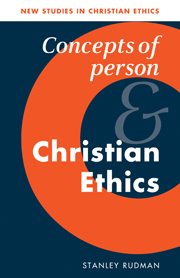Book contents
PART 2 - ‘PERSON’ IN CHRISTIAN PERSPECTIVE
Published online by Cambridge University Press: 02 December 2009
Summary
Part 2 examines some of the main ideas which have been associated with the development of divine personhood, and attempts a critical analysis of the historical developments as a prelude to examining how this might affect a Christian perspective today. Our historical inquiry into Enlightenment thought has indicated the importance of the seventeenth century as a period of transition, particularly in terms of Locke's usage which appears so clearly rational and ethical, and the monumental significance of Kant in the eighteenth century in establishing the ethical priority of persons, which nevertheless contains dangerous assumptions about rationality within it. It proved impossible from this point onwards to separate discussions of personhood from the currents of German idealism which affect so much later thinking about human nature and subjectivity. Although not complete, the picture is one of contrasting and sometimes continuing conflicting strands, some centred on the personality of God, some on ethical agency. In Feuerbach we saw how ethical and human relationship wins out and is then used to critique the idea of God as person.
Historical inquiry into the previous centuries brings into focus a depth of background not apparent or even suspected in the way moral personhood is used in contemporary ethics. As a result of recent patristic studies, it is becoming clear that ‘persona’ was used in the Latin West in the first and second centuries CE as an exegetical tool in the interpretation of scripture, and that this led to its theological use in the Christological and Trinitarian debates of the third-fourth centuries.
- Type
- Chapter
- Information
- Concepts of Person and Christian Ethics , pp. 119 - 122Publisher: Cambridge University PressPrint publication year: 1997



